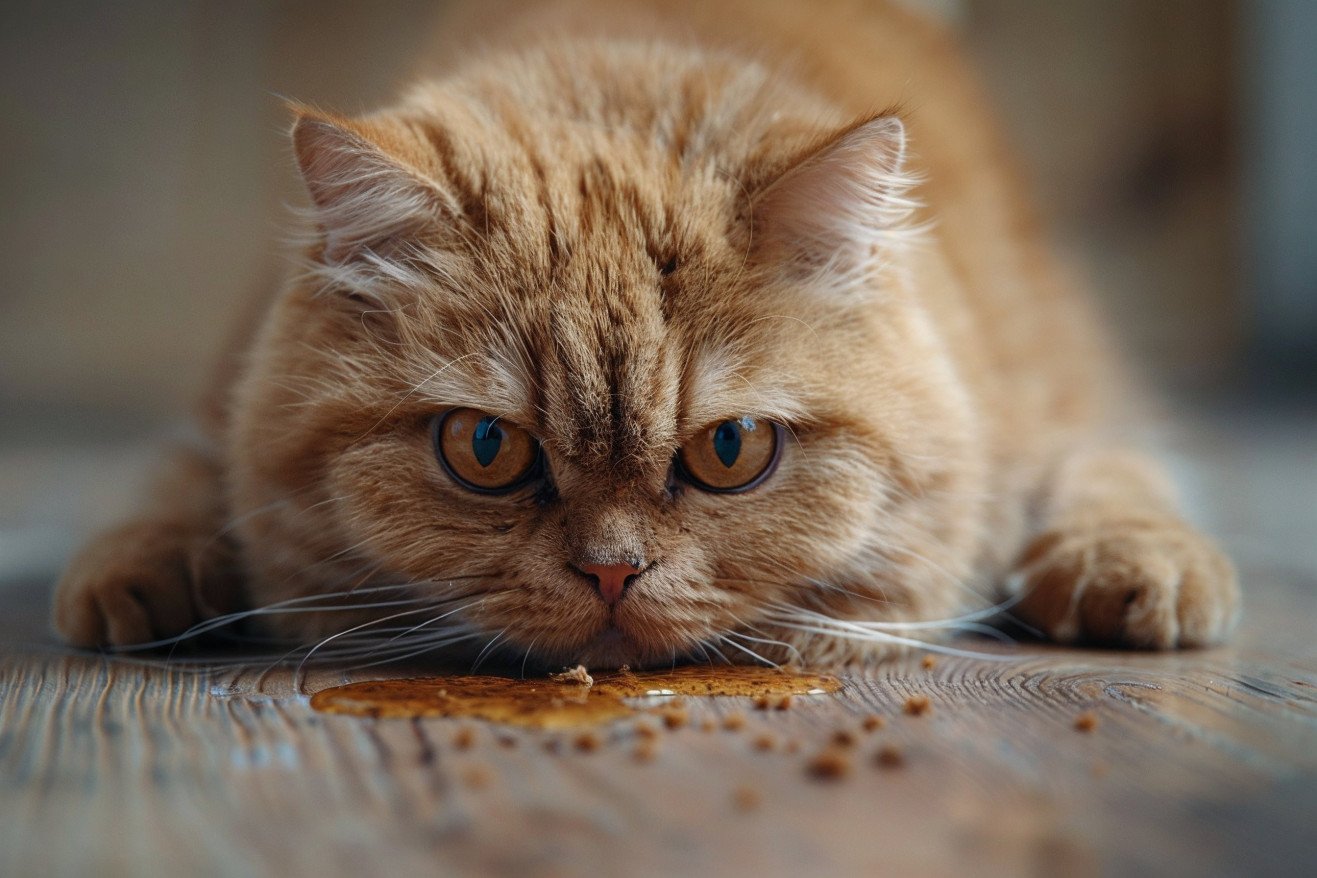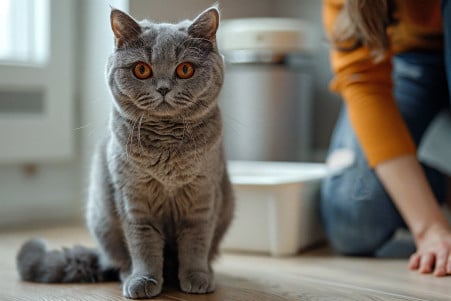Why Does My Cat Poop on the Floor? Causes and Solutions
6 April 2024 • Updated 5 April 2024

Understanding why your cat is avoiding the litter box can help you get to the bottom of the issue and get your home back to normal. Your cat might be pooping on the floor because of medical problems like urinary tract infections or digestive issues, a dislike of the litter box, stress, or a way of marking territory in response to changes in their environment. However, with a little detective work and some changes, you can often get this problem under control.
In this article, we'll look at research and expert opinions to help you understand the many possible causes of this frustrating behavior. By looking at medical causes, environmental causes, and behavioral causes, you'll be better equipped to figure out and address why your cat is pooping outside the litter box. Once you know what's going on, you can take the steps you need to help your cat get back to using the litter box.
Why does my cat poop on the floor?
Medical Causes of Litter Box Problems
Sudden changes in your cat's litter box habits, especially if they start pooping outside the litter box, can be a sign of a medical issue that needs to be addressed by a veterinarian right away. The Cornell Feline Health Center explains that urinary tract infections or inflammation can cause pain and urgency when a cat needs to urinate, leading to accidents outside the litter box. Kidney disease, thyroid disease, and diabetes can all cause an increase in the frequency of urination that may lead to a cat not being able to make it to the litter box in time.
Gastrointestinal issues such as constipation or diarrhea cited by Embassy Lakes Animal Hospital can cause discomfort when a cat needs to defecate, even if they are in the litter box. In addition, older cats may develop arthritis, mobility issues, or cognitive dysfunction that may prevent them from being able to get to or remember to use the litter box, as explained by this Cornell resource.
If your cat's inappropriate elimination is sudden or if it is accompanied by other symptoms, make an appointment with your veterinarian. A thorough physical exam can help rule out medical issues and lead to a diagnosis and treatment or management plan that can help your cat get back to using the litter box. Many medical causes of litter box problems can be managed or treated with the right interventions.
How to Set Up a Cat-Friendly Litter Box Environment
Cats are clean animals, and they may refuse to use a litter box if it is dirty or smelly, according to the ASPCA. Therefore, to set up a cat-friendly litter box environment, it is important to make sure that there are enough litter boxes for the number of cats in the home. The general rule of thumb is "one box per cat plus one extra," according to Companion Protect.
The size, location, and type of litter can all affect whether or not a cat will use a litter box. WikiHow recommends placing the litter box in a quiet area with easy access and multiple escape routes to help the cat feel secure and in control. It is also important to make any changes to the type of litter or litter box gradually so that the cat is not startled and its routine is not disrupted.
By making sure that your cat's litter box is clean, comfortable, and easy to access, you can help ensure that your cat will use it consistently. This can help you avoid litter box problems and the messes that can come with them.
Coping With Stress and Environmental Changes
Cats are creatures of habit and can be easily stressed by changes in their environment or schedule, according to The Dog People by Rover.com. New family members, pets, or home construction projects can be especially disruptive to a cat's sense of security and cause them to avoid the litter box. Dr. Stephanie Globerman at Paws Whiskers & Claws, The Feline Hospital says that stress can be caused by changes in the household, and that cats may need a "safe room" to retreat to.
To help cats adjust to changes, Cats.com suggests using calming pheromone products such as Feliway, which is a synthetic version of the feline facial pheromone that helps cats feel more secure. Making sure the cat has a safe, quiet place to retreat to can also help reduce stress during times of change. When possible, changes should be made slowly and gradually, rather than all at once, to help reduce a cat's stress and give them time to adapt.
By making sure to address the stress and anxiety that can lead to litter box avoidance, you can help your cat get back on track with their bathroom habits. With time and the right changes, many cats can overcome the stress of environmental changes.
Retraining Your Cat to Use the Litter Box
If medical and environmental causes have been ruled out, it may be time to retrain your cat to use the litter box. According to Cats.com, the first step is to stop the cycle of inappropriate elimination. This means cleaning any affected areas thoroughly with an enzymatic cleaner to get rid of the smells that may be attracting your cat to those areas.
The WikiHow guide also suggests limiting your cat's access to these areas and making them less desirable by using deterrents like aluminum foil or citrus scents. This will help ensure that your cat doesn't continue to use these areas while you are retraining.
In terms of the retraining process itself, Hearthstone Veterinary Hospital stresses the importance of a positive, step-by-step approach. Gradually reintroduce your cat to the litter box, rewarding them with treats and praise when they use it correctly. As mentioned by Cats.com, this is an important reinforcement-based approach, as punishing your cat will only make them more stubborn.
Retraining will require time and dedication, but by being patient and using a positive, reward-based approach, you can help your cat get over their litter box issues. You'll be well on your way to reestablishing peace in your home by making the litter box a place your cat wants to go again.
How to Clean Up Cat Poop and Urine Smells
Cleaning up cat poop and urine as soon as possible is important to prevent odors from lingering and to keep the cat from returning to the same area. As Danforth Carpet Connection notes, the sooner pet accidents are cleaned up, the less time the urine will have to soak in, making it easier to remove.
To get rid of odors, PetMD says you should use an enzyme-based cleaner that is specifically designed to get rid of cat urine and feces smells. These cleaners work by breaking down the compounds that cause the odor. The Vets also says that a mixture of white vinegar and water or baking soda can be used to remove urine smells as well.
It's important to note that you should not use cleaners that contain ammonia, as The Vets explains that the ammonia can attract the cat back to the same area. If the odor is particularly strong, you may need to hire a professional cleaning service or replace the flooring in the area that has been heavily soiled.
Thoroughly cleaning and removing odors is important to make sure that your home stays clean and to prevent your cat from continuing to avoid the litter box. However, with the right methods and supplies, you can make sure that you're able to clean up even the most difficult cat messes.
Conclusion: Getting Back on the Same Page With Your Cat
Dealing with litter box problems will take time, understanding, and a commitment to finding and fixing the root causes. Medical, environmental, and litter box issues can all lead to a cat pooping outside the box. However, with the right litter box conditions, stress management, and retraining, if needed, many issues can be resolved.
Proper cleaning and odor control are important to keep your home clean and to prevent your cat from returning to the same spots. With patience and dedication, you can get your cat back to using the litter box and restore peace in your home.


